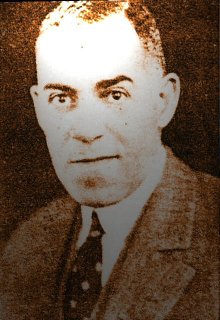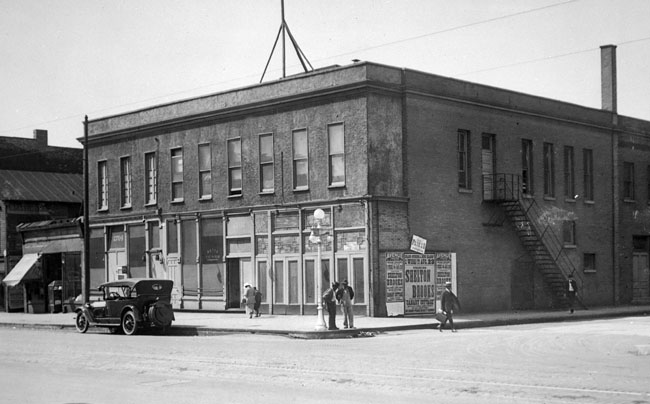
Good Morning POU!
Its common knowledge that the wealthiest members of the black community during the Jim Crow era were usually the undertakers and taking unders. Afterall – there’s no funeral without fun. Running gambling outfits from the funeral parlor, in a weird way, makes perfect sense doesn’t it?
Daniel M. Jackson (1870 – 1929)
Daniel M. Jackson was undoubtedly the most powerful African American vice lord ever known to Chicago’s black community. He was educated, thoroughly criminal, generous to African Americans in need, political, and civic-minded. Jackson, a quiet, savvy man, ran several gambling houses out of his funeral parlors; at the same time he sacrificed his own profits to help blacks that lacked money for a proper burial.
Daniel McKee Jackson was born September 9, 1870 in Pittsburgh, Pennsylvania. He came to Chicago in 1892 with his father Emanuel, and brother, Charles, and together they opened a funeral parlor at 26th and State streets in Chicago’s Second Ward.
By the time Jackson arrived in Chicago, he had graduated from Lincoln University, in eastern Pennsylvania. He and the family ran the Emanuel Jackson Undertaking Company until tension developed with his father. Because of the increased population and the concurrent lack of public health regulations, a variety of professional groups developed. Within the ranks of embalmers, casket manufacturers, funeral directors, and burial policy agents, professional associations formed to insure that funeral industry standards were met. Jackson was one of the first African Americans to use the most up-to-date undertaking techniques in his business.
Jackson relied on gambling for a large part of his income. A crackdown on gambling in 1923 by a new face in the mayor’s office, Democrat William Dever, severely reduced Jackson’s profits. Because of the Great Depression and a deteriorating economy, Jackson sought a partner, and he and Otto Stevenson, a black entrepreneur, joined forces to provide a burial insurance service to Chicago’s Bronzeville residents. Jackson did the funeral services and Stevenson sold insurance. The Metropolitan Funeral System Association (MFSA), as the company was called, continued an earlier tradition of mutual aid and beneficial societies to provide funerals to those with limited incomes. Working-class citizens received affordable funerals, prompt payment of claims, and inexpensive premiums (15 cents paid in for each dollar paid out), and the arrangement allowed recent immigrants the opportunity to return their deceased to the South for burial.
The premium that subscribers paid per policy was inexpensive and did not provide enough money to cover the cost of a funeral. When the MFSA started to falter, Stevenson lacked the personal income needed to keep the company solvent. When Stevenson departed, Jackson was unwilling to let the company dissolve, believing that it provided a useful service to needy clients. Jackson perhaps owed his solvency to the money that came his way when he married Lucy Mott, the sister of gangster Robert T. Mott, in 1925. As a result, Jackson subsidized the company until Robert M. Cole joined it in 1926.
Jackson hired Cole, former railroad porter-in-charge, to manage his mortuary business. The two probably became friends as a result of their mutual interest in gambling. After Cole joined the business as manager, Jackson continued to tend the service end of the business himself. In 1927 Cole asked Jackson to sell him the business which he did—for $500.
Cole reorganized the MFHA and later renamed it the Metropolitan Mutual Assurance Company. He hired two former associates of Jackson, professionals who restructured the company’s policies. First, premium charges were restructured and college-trained businessmen managed the accounts. Between 1927 and 1931, Cole had poured $18,000 of his gambling profits into the business to keep it afloat. Although Jackson retained his position as MFHA’s funeral director, Cole, until his death in 1956, was the real force behind the company. The firm narrowly survived the Depression, but, by the end of World War II, it was a profitable and smoothly operating business.
If Jackson viewed the MFHA as his own private charity, he had no such view of others’ businesses. In the Second Ward and parts of the Third, he was known as the uncontested vice-lord of Chicago’s African American settlement. Throughout Prohibition, except for two brief periods, Jackson controlled blind pigs (speakeasies or places that sold alcohol illegally), prostitution, gambling, and policy (betting) wheels. From Second Ward operations in liquor and gambling, Jackson’s bagmen collected about $500,000 per year—and from the Third Ward and adjacent areas, another $200,000. Jackson’s secretary, Carter Hayes, collected protection money—approximately 40 percent of the proceeds—from each of the illegal games in operation. Jackson’s men also shook down pool halls, saloons, and cabarets that operated craps, poker, and blackjack games and sold gin and whiskey on the premises. The quiet, shrewd Jackson ran several gambling houses. Two were located in his funeral parlors and a third in the famed Pekin Theater building (which Jackson owned as result of Robert Mott’s death).

Jackson turned the once renowned Pekin into a burlesque, and opened a scandalous “black-and-tan” cafe, the Beaux Arts, on the second floor, where racially-mixed customers danced to Jazz music. Hundreds attended on weekend nights. A 1917 police report states:
Lieut. Loftus…visited the “club” on the night of April 8 and found the dancing “very disgusting.” There were 300 white and colored couples on the floor, the majority of whom were doing an underworld dance.
Jackson was an anomaly—a soft-spoken man who ran a mortuary and did so even after the business lost money so his clients could receive just the kind of funerals they wanted. He was kind to his associates and gave them help in starting businesses, and he stood up for those he believed in. Toward the end of his career, Jackson served as the link between black belt gamblers and Mayor Big Bill Thompson.
Jackson was also persuasive and not above using his political power to get what he wanted. He had ties to mobsters and his business and political dealings were outside the law, yet Jackson seems to have believed in certain positive values, such as self-determination.
An anomaly indeed.

